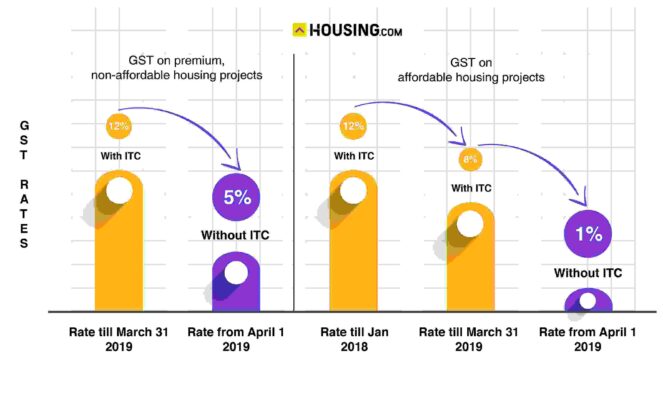To subsume almost all indirect taxes in India, except for a few state taxes, the government in 2017 launched the Goods and Services Tax (GST) regime that is in line with globally-accepted tax regimens.
The Goods and Services Tax (GST) covers real estate in India through works contracts and building and constitution works as all components used in the development work attract GST. To put it simply, covered under the new regime is the Indian construction industry, which continues to attract high rates of taxes through a blend of levies imposed on the purchase of various building construction materials.
Check out our guide on GST search and GST verification
GST on construction, building materials
GST is a four-tier tax builders in India have to pay on purchase of construction and building material. The GST rate on construction materials and building materials ranges between 5% and 28%.
See also: E way bill login: All you need to know
GST on construction and building materials 2023
Discussed in detail in this article are the taxes one has to pay as GST on various building materials.

Also read: GST portal login
Sand GST rate
5%: Natural sand of all kinds other than metal-bearing sand.
18%: Bituminous or oil shale and tar sands, bitumen and asphalt, natural asphaltites and asphaltic rocks.
Cement GST rate
28%: On portland cement, aluminous cement, slag cement, super sulphate cement and similar hydraulic cement. The government is considering brining the GST on cement to 18%.
GST on bricks
5%: Building bricks and other bricks of fossil means and other siliceous earth or fly-ash bricks.
GST on supply of bricks hiked to 12%
In a move that will eventually increase the cost of property, the GST Council decided to increase the tax on supply of bricks to 12% with ITC benefits. This GST hike on supply of bricks will come into effect from April 1, 2022.
“Brick kilns would be brought under a special composition scheme with a threshold limit of Rs 20 lakhs, with effect from April 1, 2022. Bricks would attract GST at the rate of 6% without input tax credit under the scheme. GST rate of 12% with ITC would otherwise apply to bricks,” the GST Council said after its meeting on September 17, 2021, in Lucknow, UP.
18%: Tile, refractory bricks and ceramic goods.
28%: Materials made of cement, artificial stone or concrete like brick, flagstone, building blocks, cemented bricks, including prefabricated components for building construction; glass-based paving blocks, including squares, tiles, slabs, objects of pressed glass used in the construction process, glass cubes and small glass wares for decorative purposes, including leaded lights, foam glass used in blocks, plates and panels, etc.
See also: How to get a home construction loan, to construct your own house
GST on gravel and crushed stone
5%: Pebbles, gravel and crushed stone used in concrete.
GST on marble and granite
12%: On marble and granite blocks.
28%: Marble, granite and travertine not in blocks.
GST rate on building stone
5%: Porphyry, basalt, sandstone and other monumental or building stone, both, in blocks and slabs.
GST on steel
18%: On iron blocks, wire, rolls and rods.
GST rate for tiles
5%: Earthen or roofing tiles.
18%: Bamboo flooring tiles.
28%: Cement tile, concrete tile, artificial stone tile, floor coverings of plastics in rolls or in the form of tiles, wall or ceiling coverings of plastics, panels, boards, tiles, blocks and similar articles of vegetable fibre of straw or of shavings, chips, particles, sawdust or other waste, of wood, agglomerated with cement, plaster or other mineral binders, ceramic flooring blocks, support or filler tiles, articles of plaster like boards, sheets, panels, tiles and similar articles, hearth or wall tiles, ceramic mosaic cubes, glazed ceramic flags and paving, hearth or wall tiles and glazed ceramic mosaic cubes.
GST on coal
5%
See also: All about the National Building Code
GST rate for interior materials used in construction
GST on mica
12%: On worked mica and articles of mica.
GST rate on electrical machinery
28%: Electrical machinery and equipment and their parts.
GST rate on paint and varnish
28%: Paints, varnishes, enamels, lacquers based on synthetic polymers or chemically modified natural polymers, glaziers’ putty, grafting putty, resin cement, caulking compounds, painters’ fillings, non-refractory surfacing preparations for façades, indoor walls, floors and ceilings.
GST rate on bathroom fittings
18%: Tube or pipe fittings like couplings, elbows and sleeves made of copper, aluminium, plastic, nickel, iron and steel.
28%: Ceramic sinks, wash basins, wash basin pedestals, baths, bidets, water closet pans, flushing cisterns, urinals and similar sanitary fixtures, sanitary ware and their parts made of iron and steel, ceramic pipes, conduits, guttering and pipe fittings.
GST rate on wallpapers
28%: All types of wallpapers and wall coverings.
FAQs
What is the rate of the GST on steel?
From July 1, 2017 the rate of GST for steel is 18%. The GST rate for some of the input used by the steel industry like iron, coal and transportation services is 5%.
Types of cement are classified under which code of the GST?
Types of cement are classified under chapter 25 of the HSN Code.

An alumna of the Indian Institute of Mass Communication, Dhenkanal, Sunita Mishra brings over 16 years of expertise to the fields of legal matters, financial insights, and property market trends. Recognised for her ability to elucidate complex topics, her articles serve as a go-to resource for home buyers navigating intricate subjects. Through her extensive career, she has been associated with esteemed organisations like the Financial Express, Hindustan Times, Network18, All India Radio, and Business Standard.
In addition to her professional accomplishments, Sunita holds an MA degree in Sanskrit, with a specialisation in Indian Philosophy, from Delhi University. Outside of her work schedule, she likes to unwind by practising Yoga, and pursues her passion for travel.
[email protected]












